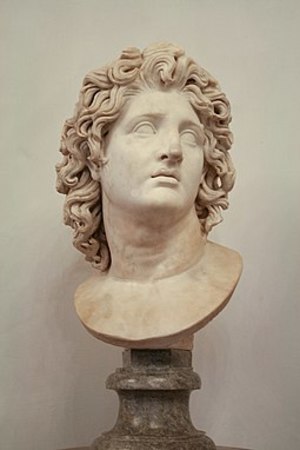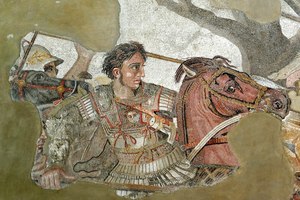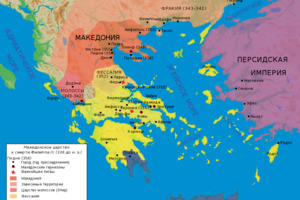Alexander the Great
Alexander the Great (Ancient Greek: Ἀλέξανδρος Γ' ὁ Μέγας; possibly July 20/23 or October 6/10, 356 BC – June 10/13, 323 BC) was the king of Macedonia from the Argead dynasty (from 336 BC), an outstanding military commander, and the creator of a world empire that disintegrated after his death. Ascending the throne at the age of 20 following the assassination of his father, Philip II, he suppressed the Thracian uprising and re-subjugated Greece, where rebellious Thebes was destroyed. In 334 BC, Alexander crossed into Asia Minor, thus initiating a war against the Persian Empire. At Granicus, he defeated the satraps, and at Issus (333 BC), he vanquished King Darius III himself, subsequently subduing Syria, Palestine, and Egypt. In 331 BC, at Gaugamela in Mesopotamia, Alexander achieved a decisive victory. Darius was later assassinated. Alexander, having occupied the central regions of Persia, assumed the title of "King of Asia," surrounded himself with representatives of the eastern nobility, and began contemplating world conquest. Within three years (329–326 BC), he conquered Central Asia. Invading India, the king also began to achieve victories there, but his army, exhausted from the long campaign, revolted, forcing Alexander to turn back. In 324 BC, he arrived in Babylon, which became his capital. However, the following year, during preparations for an expedition to Arabia, Alexander died at the age of 32.
The empire he created during his conquests soon disintegrated, divided among the king's generals, the Diadochi. Nevertheless, thanks to Alexander's campaigns, the spread of Greek culture in the East began, laying the foundation for Hellenism.
Origin
Alexander belonged to the Argead dynasty, which ruled Macedonia from the beginning of its history. Ancient authors classify this dynasty as Heracleids; according to legend, either Temenid Karan (the younger brother of King Argos Phidon and a descendant of Heracles in the eleventh generation) or his son Perdiccas migrated from the Peloponnese to the north in the 7th century BC, where they established their kingdom. Perdiccas' son, Argaeus, gave his name to the dynasty. His distant descendant was Alexander III. It is worth noting his equally famous teacher who had a significant influence on Alexander - Aristotle.
Until the 4th century BC, Macedonia was a small and weak kingdom, suffering from incursions by Thracians and Illyrians from the north and Hellenic expansion from the south. Although the Macedonians spoke, apparently, one of the dialects of the Greek language, the Greeks considered them barbarians. Alexander's grandfather, Amyntas III, belonging to the junior branch of the dynasty and having seized power by assassinating his predecessor, maintained his position only by maneuvering between different states of Hellas. His son, Philip II, was able to significantly increase state revenues, create a strong army, subjugate the princes of Upper Macedonia, defeat the northern neighbors, and start conquering Greek poleis one by one. Philip's wife and Alexander's mother was Olympias, a princess of Epirus and the daughter of King Neoptolemus I from the Aeacid dynasty, whose lineage traced back to Achilles. Thus, Alexander was considered a descendant of gods and the greatest heroes of antiquity through both his paternal and maternal lines. The realization of this fact significantly influenced the formation of his personality.
Philip II was married a total of seven times and lived with all his wives simultaneously. Alexander's full sister was Cleopatra. In addition, Alexander had a full-blooded brother, Arrhidaeus (from Philinna of Larissa), and half-sisters: Thessalonike (from Nicesipolis of Pherae), Cyna (from Illyrian princess Audata), and Europa (from Cleopatra). Arrhidaeus was a year older than his brother but suffered from mental disability, so Alexander was considered the only possible heir to his father.
State policy of Alexander the Great
Alexander used the death of his father to eliminate all potential threats to his power. Two Lyncestian representatives (members of a noble family from Upper Macedonia), Arrhidaeus and Heromenes, were crucified at the tomb of Philip. Amyntas, Alexander's cousin and brother-in-law, was killed; one source mentions Karanus, the king's half-brother, who was also killed. Attalus was executed on charges of treason, and the same fate was shared by all male relatives. Finally, Olympias forced Cleopatra, Philip's last wife, to commit suicide, and ordered the killing of her newborn daughter. As a result, Alexander had no potential enemies within Macedonia. The nobility and the people were won over by the new king through the abolition of taxes, disregarding the empty treasury and a debt of 500 talents.
At the time of Alexander's rise to power, the Macedonian Kingdom was a large territorial state. It included not only Lower Macedonia but also Upper Macedonia, as well as Thrace, parts of Illyria, and the entire northern coast of the Aegean Sea, which had previously been controlled by independent Greek city-states. Epirus was in a dependent position (ruled by Philip's brother-in-law, obligated to him for the throne), as well as the Thessalian League (of which Philip was a tagus) and the Corinthian League, which included the rest of Greece except for Sparta and recognized Philip as its hegemon with broad powers. The Greeks formally acknowledged allegiance not to Macedonia but to its king and after his death considered themselves independent. In Athens, the enemies of Macedonia openly rejoiced at Philip's assassination, and the cities of Thebes and Ambracia attempted to expel the garrisons left by Philip.
In this situation, Alexander acted decisively. He swiftly moved south with his army, secured his election as tagus of Thessaly, and then entered Central Greece, setting up camp near Thebes. The Greek city-states, caught off guard, expressed their submission and sent delegates to Corinth, where the treaty concluded after the Battle of Chaeronea was reaffirmed. While maintaining formal independence, all of Hellas (except for Sparta) now submitted to Alexander as the hegemon of the Corinthian League and the supreme commander in the upcoming Persian campaign. Many city-states allowed Macedonian garrisons to enter their territories.
Before returning to Macedonia, Alexander met the Cynic philosopher Diogenes in Corinth. According to legend, the king offered Diogenes anything he desired, to which the philosopher replied, "Don't block my sunlight." The king was so amazed by the pride and greatness of the philosopher, who treated him with such disdain, that on his way back he said, "If I were not Alexander, I would want to be Diogenes." Later, Alexander visited Delphi, where he demanded the Pythia to predict his destiny and heard the response, "You are invincible, my son!"
Meanwhile, the Illyrians and Triballi were preparing for war in the north. The king decided to strike preemptively. In the spring of 335 BCE, he led a 15,000-strong army towards the Danube. In the Battle of Mount Haemus, Alexander defeated the Thracians who held a strong position on the heights, and then achieved victory over the Triballi. The ruler of the Triballi, Syrmus, took refuge on the island of Peuce in the Danube. On the northern bank of the river, the troops of the Getae tribe gathered, and Alexander considered it a challenge. He transported his army across the Danube on makeshift rafts, defeated the Getae, and thereby deprived the Triballi of their last hope for success. Accepting the surrender of this tribe, Alexander moved into Illyria. There he besieged the fortress of Pelium, was surrounded by enemies, but managed to break through and then lured the Illyrians down from the heights to the plain with a deceptive maneuver and crushed them.
During this campaign (March-May 335 BCE), Alexander demonstrated exceptional military talent, the ability to improvise, and the equally important ability to effectively control large and diverse military contingents. Plutarch even refers to this campaign as "perhaps the most brilliant and swift" in Alexander's biography. The king was able to completely secure the northern borders of Macedonia for the following years, replenished his army with Thracian, Illyrian, and Triballian warriors, and seized valuable plunder. However, in Greece, rumors spread of Alexander's death due to his prolonged absence. Believing this news, the people of Thebes rose in rebellion and besieged the Macedonian garrison commanded by the phrourarch Philotas in Cadmea. The Athenians who supported the rebellion began negotiations for an alliance with the Persians, and the city-states of the Peloponnese moved their troops towards the Isthmus. Alexander learned about this in Illyria and immediately headed south, reaching Boeotia in just 13 days.
Upon learning that the king was alive, the Peloponnesians and Athenians immediately ceased hostilities. Only Thebes remained, refusing to surrender. In September 335 BCE, Alexander, with the support of the other Boeotian city-states, besieged Thebes. Through a combined attack from outside and within Cadmea, the Thebans were defeated, and a massacre unfolded in the streets, resulting in the death of 6,000 citizens. Alexander left the fate of the city to his Greek allies. They decided to destroy Thebes, leaving only Cadmea, dividing the land among neighboring states, and enslaving the population. A total of 30,000 people were sold into slavery. With the money obtained (approximately 440 talents), Alexander fully or partially covered the debts of the Macedonian treasury. No one else resisted Macedonia. The Greeks, astonished by the king's swift victory and the fate of the ancient city, in some cases even brought politicians to trial for inciting rebellion. Alexander only demanded that the Athenians exile one orator and then returned to Macedonia, where he began preparations for his campaign into Asia.
Related topics
Ancient Greece, Alexander the Great's military campaigns, Aristotle
Literature
- Mark Annens Lucan. Pharsalia. - Moscow: Ladomir, 1993. - 352 p. - ISBN 5-86218-056-7.
- Lucius Annaeus Seneca. Letters to Lucilius on Morality. Retrieved: May 7, 2018.
- Appian of Alexandria. Roman History. - Moscow: Ladomir, 2002. - 880 p. - ISBN 5-86218-174-1. Archived copy from June 28, 2017, on the Wayback Machine.
- Arrian. The Campaigns of Alexander. Translated from Ancient Greek by M. E. Sergeenko. - Moscow: Mif, 1993. - 272 p.
- Herodian. History of the Roman Empire after Marcus. - Moscow: ROSSPEN, 1996. - 272 p. - (Classics of Antiquity and the Middle Ages). - ISBN 5-8600-4073-3.
- Herodotus. The Histories. - Moscow: Ladomir, 2001. - 752 p. - ISBN 5-86218-353-1.
- Dio Cassius. Roman History.
- Quintus Curtius Rufus. The History of Alexander the Great. With the Inclusion of Works by Diodorus, Justin, Plutarch on Alexander. - Moscow: MSU, 1993. - 464 p. - ISBN 978-5-211-02061-8.






